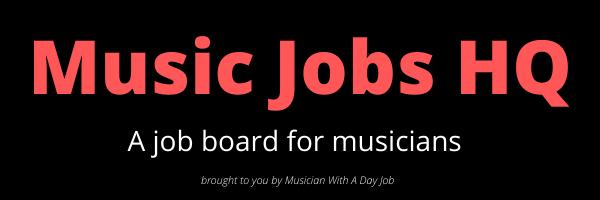
Do you have trouble getting stuff done?
Yeah, I’m in that place sometimes.
But the one thing that boosts my productivity into overdrive is…
Setting goals.
And the most effective way to set goals that get you where you want to be is the SMART Goals method.
My weekly email helps part-time musicians stay encouraged and motivated by sharing 5 resources from the internet. Join the 1,200+ other musicians benefitting from it.
Table of Contents
What are SMART Goals?
SMART is an acronym that helps you remember how to set useful goals.
Obviously, you can set goals however the heck you want.
But this method will ensure you set goals that are…well, smart.
Goals you can actually reach — that will get you where you want to be in music.
What is the acronym?
SMART goals are:
- Specific
- Measurable
- Achievable
- Relevant
- Time-bound
I’ll talk about how to apply each of these below.
Specific
Stop setting goals like, “Become a full-time musician someday.”
That’s not a goal. That’s a dream.
Your goals have to be way more specific.
Take that dream and break it apart.
What kind of musician do you want to be?
What income streams will allow you to be full-time?
When do you want this to happen?
For example: “By the end of [YEAR], I want to be a full-time songwriter and producer who makes music for TV/film.”
Get more specific about what you want. That will help you actually get there.
Measurable
A measurable goal is one that you know you’ve reached when you’ve reached it.
There has to be some indicator of achieving the goal.
For example, the goal “Release a song this month” is clearly measurable. Once you’ve released it, you’ve accomplished the goal.
On the other hand, if you say, “Release more music this year,” that’s not measurable.
What does “more” mean here?
Set measurable goals so it’s obvious when you’ve reached them.
Bonus: after you’ve reached a goal, keep track of it.
Over time, you’ll end up with a list of all the goals you’ve completed, which will keep you encouraged.
(Click here to download the free worksheet I use to set and track my goals).
Achievable
Your goals need to be smaller than you think.
Cut them in half.
Then cut them in half again.
So, instead of saying “Release an album this year,” change that to “Record a song this month.” or even “Make the beat for a song this week.”
See how much more manageable that is? It makes it way more doable.
As author Jon Acuff says, “…If you really want to win, go small.”
Relevant
Your goals also need to be relevant to what you actually want as a musician.
Don’t do what I did for 10 years, which was to follow the path of every other musician, just because I thought that was the only way to succeed.
Knowing what you want requires some introspection.
You’ve got to be honest about what you enjoy doing.
For example, I realized I don’t love performing. So that takes a backseat to songwriting and producing.
So first, figure out what you want in music. Find your big picture.
Then set goals that are relevant to that big picture — and only those goals.
Time-Bound
If you’re like me, you work much better with schedules and deadlines.
And once I started setting time-bound goals, it helped me be a lot more productive.
This goes back to that example of using a timeline instead of saying “someday.”
When do you want to achieve a goal? Based on the size of your (small) goal, how much time do you need to reach it?
This could be “Choose the songs that will be on my forthcoming EP by [MONTH/YEAR].”
Or “Finish that co-write by the end of [MONTH/YEAR].”
Then you have a clear due-by date.
And that will give you the kick in the pants to get on it.
Final Thoughts
After I started setting SMART goals…
I got accepted to a couple of sync licensing libraries, my song got on NBC, I started making consistent income from music, and most importantly…
I stay encouraged.
Trust me, start setting SMART goals and you won’t look back.
Because you’ll be too busy moving your music career forward.
My weekly email helps part-time musicians stay encouraged and motivated by sharing 5 resources from the internet. Join the 1,200+ other musicians benefitting from it.
Further reading
- Casino Not On Gamstop
- Non Gamstop Betting Sites
- Non Gamstop Casinos UK
- Casino Retrait Immédiat
- Casino Sites Not On Gamstop
- Gambling Sites Not On Gamstop
- Non Gamstop Casinos UK
- Non Gamstop Casino Sites UK
- Slots Not On Gamstop
- Non Gamstop Casino UK
- Meilleur Casino En Ligne
- Beste Online Casino Nederland
- Non Gamstop Casino UK
- Casino Sites Not On Gamstop
- Non Gamstop Casinos
- UK Casinos Not On Gamstop
- Sports Betting Sites UK
- Slot Sites Uk
- Gokken Zonder Cruks
- Non Gamstop Casinos
- Non Gamstop Casinos UK
- UK Casino Sites Not On Gamstop
- UK Online Casinos Not On Gamstop
- Migliori Casino Non Aams
- Migliori App Casino Online
- Migliori Casino Non Aams
- Top 10 Casino En Ligne Belgique
- I Migliori Casino Non Aams
- Meilleur Site Pour Jouer Au Poker
- Paris Sportifs Crypto
- KYC 인증 없는 카지노
- Casino Live En Ligne Français
- 온라인홀덤
- Top Casino En Ligne
- Casino En Ligne
- Casino Italia Non Aams
- Casino En Ligne Français
- Migliori Siti Casino Non Aams 2026
- 카지노코인
